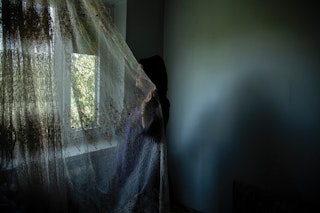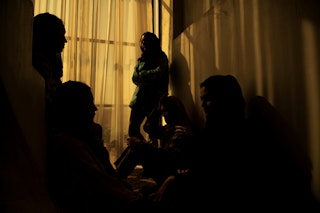WE ARE BARELY BREATHING. THERE IS NO LIFE HERE.
Mursal
"As the provinces were falling at the hands of the Taliban, everyone was really scared. People were fleeing their houses and escaping to larger cities, like Kabul or Mazar. My home province, Jawzjan, was among the first provinces to fall to the Taliban. We were on the run between our village and the city [of Jawzjan], because I was a student and didn’t want to fall behind in my lessons. People were really scared and scattered.
[The Taliban takeover] caused a lot of changes in our lives. For instance, in terms of culture: We had to accept the culture of other people under pressure. In terms of education: We had to attend our schooling under new conditions and with a new appearance. In terms of economy: Most of the people were poor, but became poorer.
It was really difficult for us to go to school or our supplementary classes. On test days, it was very difficult for us to concentrate on the test. Planes were dropping bombs on different parts of the city during the first days of the fall of Jawzjan, yet we continued to attend our lessons and take the tests. The principal and teachers would tell us we could stay home because of the tense situation, but we never gave up. We continued to go to school.
Nothing could stop us from getting an education, not even living under the rule of an extremist, exclusionary, and fanatical group. Although it was difficult to study and focus on our lessons, we didn’t give up.
When the Taliban took over Jawzjan, they enforced many limitations on students, especially female students. They forced women to wear strict hijabs. Our educational centres were shut down. But we would enter the centres secretly. Our schools were shut down, and they [the Taliban] entered our classes with a frightening appearance to cause us stress and anxiety.
Once, they came to our school to oversee the observance of the hijab decree among female students. They were so frightening that everyone was stressed out. They came in with their guns, despite the fact that under no law or condition can armed persons enter a classroom full of students. All of us got scared.
[Prior to the Taliban takeover] boys and girls used to study in the same classroom in [private] educational centres; however, there was a curtain between them. The Taliban insisted that the classes should be separated into two different classrooms, but the educational centres could not afford this. The Taliban solution was to create a wall in the middle of the classroom, so that boys and girls wouldn’t see each other.
We [the female students] were forced to accept their [the Taliban] dress code. We had to dress all in black. Except for our eyes, no other part of our entire body should be seen. We were forced to accept all of it. Rumour has it that girls are not allowed to travel to other provinces to pursue their education; whereas under the previous government, girls could travel to other provinces for higher education.
In terms of access to education and the right to work, women were more comfortable with the former government. According to the new limitations from the Taliban, women cannot go to other provinces for higher education, nor can they work in other provinces. It gives us a very bad impression. We are taking the university entrance exam this year. The security and new restrictions mean it is a difficult time for us. We are worried.
My biggest fear now is the university entrance exam. This test will have a profound impact on my future. On practice tests, I usually score 348 or 350 (out of 360), which means I would be ranked first in this test. I fear whether the Taliban would allow women or girls such as me to travel to other provinces, like Kabul, Herat or Mazar, to attend medical school. I really wish to go and study medical sciences.
First, a government or a society without women cannot last for long. This Taliban will certainly collapse, if not today, surely tomorrow. We hope for that day. Even if it does not collapse, I have no perspective on what my next three or four years will look like.
I keep thinking about whether I can be an example of serving my people as a woman. Can I help create a comfortable society? Do I give hope to others through my work? Are others, especially girls and those who go to school, motivated by my work? Am I a role model for others?
If the Taliban allows women and girls to work and get an education, not only will they have a bright future for themselves, but they will also have positive impacts for Afghanistan and Afghan society."
